Catalonia Bans Single-Use Printer Cartridges
July 12, 2024
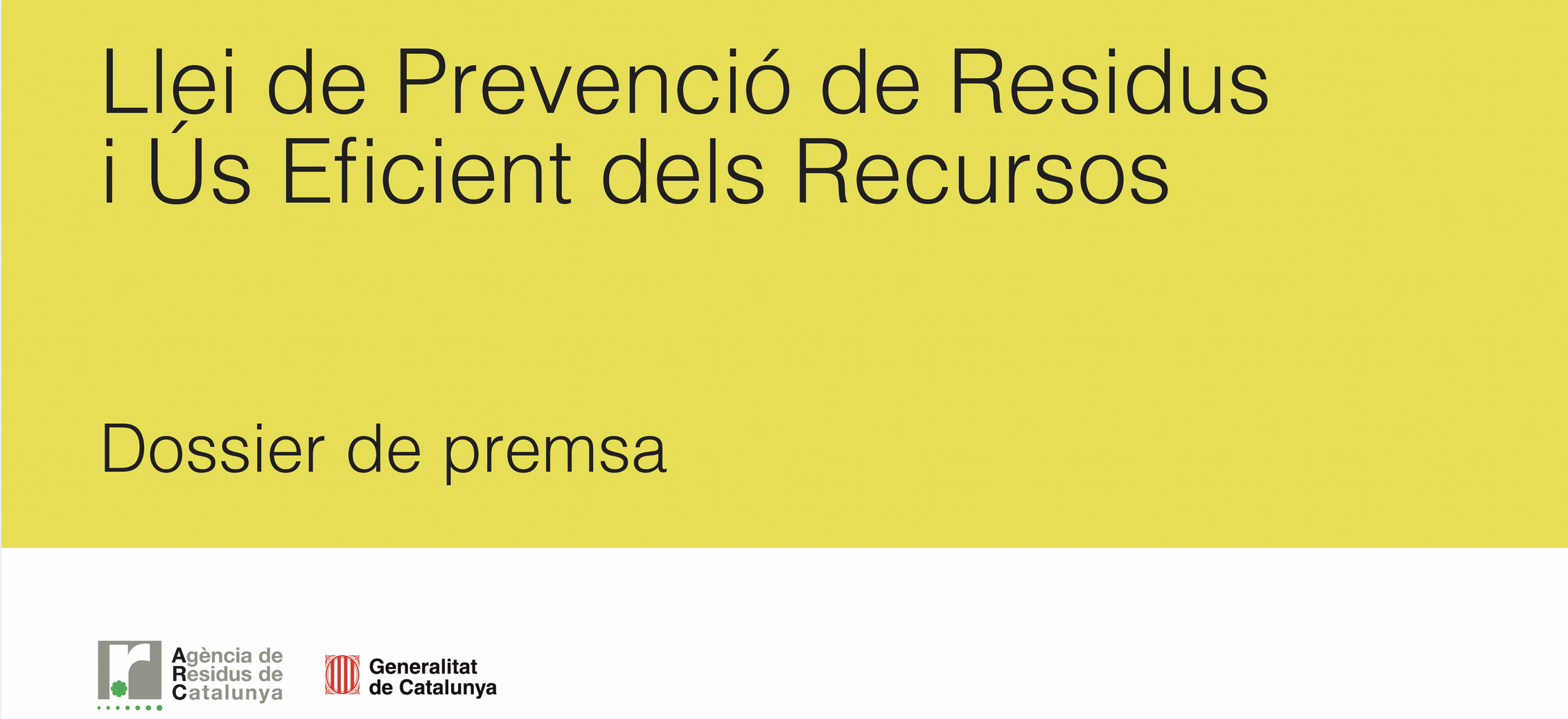
Catalonia has enacted a new waste law emphasizing circular economy principles, a significant step towards environmental sustainability. The legislation, inspired by similar measures in the Balearic Islands, aims to revolutionize waste management across various sectors, including document printing.
ETIRA (European Toner and Inkjet Remanufacturers Association) has been actively engaged in discussions with Catalonia’s Waste Prevention Agency. These discussions have focused on the new law and the broader implementation of circular criteria in document printing. Key strategies include extending the lifespan of devices and reusing consumables, which are crucial for reducing economic and environmental costs.
“The new waste law in Catalonia has a strong circular ambition and includes several measures from the Balearic waste law, which Mr. Sebastia Sanso presented at the FOE last year. ETIRA has been contacted by the Waste Prevention Agency to discuss not only this specific topic but also the implementation of circular criteria in document printing. This involves extending the lifespan of devices and reusing consumables to reduce both economic and environmental costs. ETIRA recognizes and appreciates the commitment of the Catalan Waste Agency (ARC) and the Center for Telecommunications and Information Technologies (CTTI) in leading the ‘Circular Economy’ initiative,” stated ETIRA.
A cornerstone of the new law is the ban on single-use printer cartridges and toners, effective January 1, 2025. This measure is part of a broader prohibition on single-use items and non-recyclable products. Other significant bans include:
- Prohibition of single-use plastic utensils and food containers in restaurants.
- Ban on the sale and distribution of products containing micro and nanoplastics.
- Large food retailers are required to allocate 20% of their sales area to bulk or reusable packaging.
- Ban on providing plastic bags of any thickness at points of sale and for home deliveries.
- Prohibition on non-rechargeable razors in the Catalan market from January 1, 2025.
Catalonia, located in northeastern Spain, is a significant economic powerhouse contributing substantially to the country’s GDP. With its capital, Barcelona, Catalonia boasts diverse commercial activities, including manufacturing, services, tourism, and technology.
The region is renowned for its dynamic industrial sector, encompassing the automotive, chemical, and pharmaceutical industries. Catalonia’s ports, particularly the Port of Barcelona, serve as crucial hubs for international trade, facilitating extensive import and export activities.
These bans are aligned with Catalonia’s goal to reduce waste and promote the reuse of materials, fostering a culture that moves away from single-use products.
ETIRA’s collaboration with Catalonia’s authorities signifies a solid commitment to a sustainable future. The new law sets a precedent for other regions by incorporating circular economy principles in document printing, highlighting the importance of innovation and responsibility in waste management.
Tags
CataloniaReuse
Sustainability
ETIRA Secures Victory for Sustainability in Spanish Airport Authority Tender
July 1, 2024

In a landmark achievement for sustainability, the Spanish airport authority, AENA, has agreed to include remanufactured printer cartridges in their tender process following the intervention of ETIRA (European Toner and Inkjet Remanufacturers Association). This decision marks a significant step towards promoting reuse, a core principle of the European Green Deal.
Previously, AENA’s tender specifications required only OEM printer cartridges, to ensure product quality following concerns about extremely poor quality of “Compatibles” thereby disadvantaging the reuse sector. Recognising the potential environmental impact, ETIRA, led by President Javier Martinez and supported by Secretary General Vincent van Dijk, vigorously lobbied for a change in the tender requirements.
ETIRA’s efforts have paid off, as AENA has now revised its tender to accept remanufactured cartridges produced in Europe. This change supports the circular economy and ensures compliance with stringent environmental standards. Remanufactured consumables may be accepted, provided they originate exclusively from the European Union and demonstrate the highest quality and environmental respect through a Type I environmental label in accordance with ISO 14024.
AENA’s compromise with sustainability is clear, and it has taken a new step forward. Most of the company branches are EMAS-certified.
Javier Martinez expressed his satisfaction, stating, “This decision by AENA is a significant win for sustainability and the environment. It demonstrates the value of remanufacturing and supports our goal of reducing waste and promoting reuse.”
Vincent van Dijk added, “We are delighted that AENA has recognized the importance of including remanufactured cartridges. This sets a positive precedent for other organizations to follow.”
ETIRA’s successful advocacy underscores the importance of collaboration and persistence in achieving environmental goals, paving the way for a greener future in Europe.
Beware of Illegal Printer Cartridges:
May 28, 2024
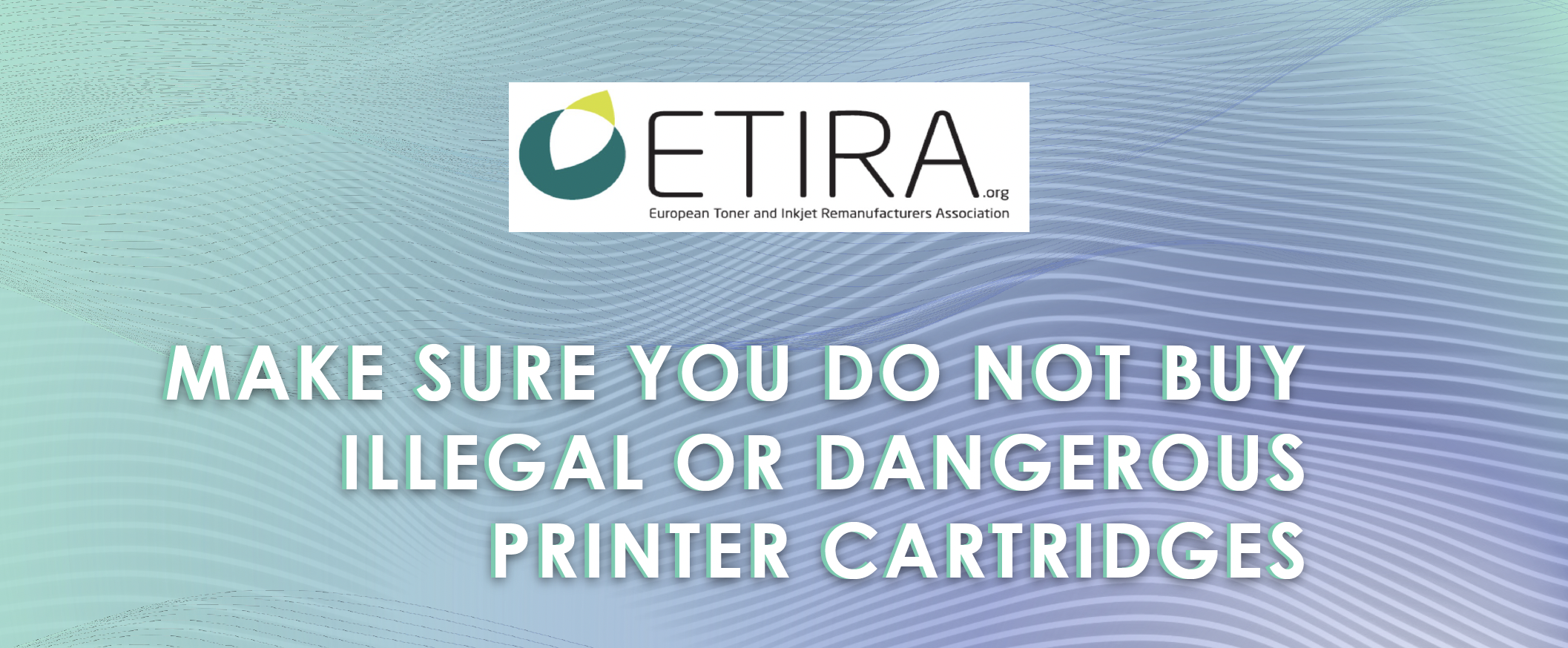
Beware of Illegal Printer Cartridges: A Call to Action from ETIRA- ETIRA model protest letter
At the recent The Recycler Live conference, Javier Martinez brought to light a pressing issue facing our industry: the prevalence in the EU market of non-OEM newbuilt printer cartridges that fail to comply with EU regulations. Javier Martínez presented eye-opening research and a stark warning to consumers and industry professionals alike.
The Scope of the Problem
ETIRA’s research reveals that one-third of printer cartridges sold in Europe are non-compliant with EU standards. These newbuilt cartridges, often manufactured in China, lack proper labelling and safety information, making them both illegal and potentially hazardous. The environmental impact is staggering, with these non-compliant cartridges contributing to 420,000 tons of e-waste annually in Europe alone. Moreover, they are responsible for causing early damage to 20% of printers, exacerbating the e-waste problem.
Legal and Environmental Hazards
These newbuilt non-OEM cartridges do not meet critical EU regulations such as CE marking, WEEE, RoHS, and REACH. They often omit essential labels like the waste bin icon, misleading consumers about the appropriate disposal methods and increasing environmental risks. By avoiding these compliance measures, manufacturers reduce costs but at the expense of consumer safety and environmental health.
The Importance of Consumer Education
Educating consumers is crucial in distinguishing between legal and illegal cartridges. ETIRA recommends remanufactured OEM cartridges, particularly those made in Europe, as the best legal and environmentally friendly option. These cartridges comply with all EU regulations and offer significant environmental benefits. By shifting to remanufactured cartridges, we can reduce CO2 emissions by up to 45-60% and lower consumer costs by as much as 60%.
Taking Action
ETIRA calls for increased vigilance and regulatory enforcement to combat the sale of these illegal cartridges. Consumers and businesses should demand proper documentation and report any non-compliant products to authorities. ETIRA has a model letter, available upon request, that members may send to public bodies, to insist that public tenders comply with all EU legal requirements. By ensuring that the cartridges we purchase and use are legal, we can protect our environment and promote sustainable practices within our industry.
Conclusion
The findings underscore the urgent need for regulatory compliance and industry and consumer awareness. The proliferation of illegal, non-compliant newbuild printer cartridges poses significant environmental and public health risks. We can drive positive change in the industry by choosing remanufactured OEM cartridges and supporting compliant practices. ETIRA remains committed to advocating for a safer, more sustainable future in the toner and inkjet remanufacturing sector.
Together, we can make a difference. Let’s act now to ensure the cartridges we use are safe, legal, and environmentally friendly. For more information and to stay updated on our initiatives, visit our website at etira.org.
Tags
ComplianceREACH
WEEE
ETIRA/The Recycler Live Conference in Brussels: EU Ecodesign Rules Take Centre Stage!
May 25, 2024
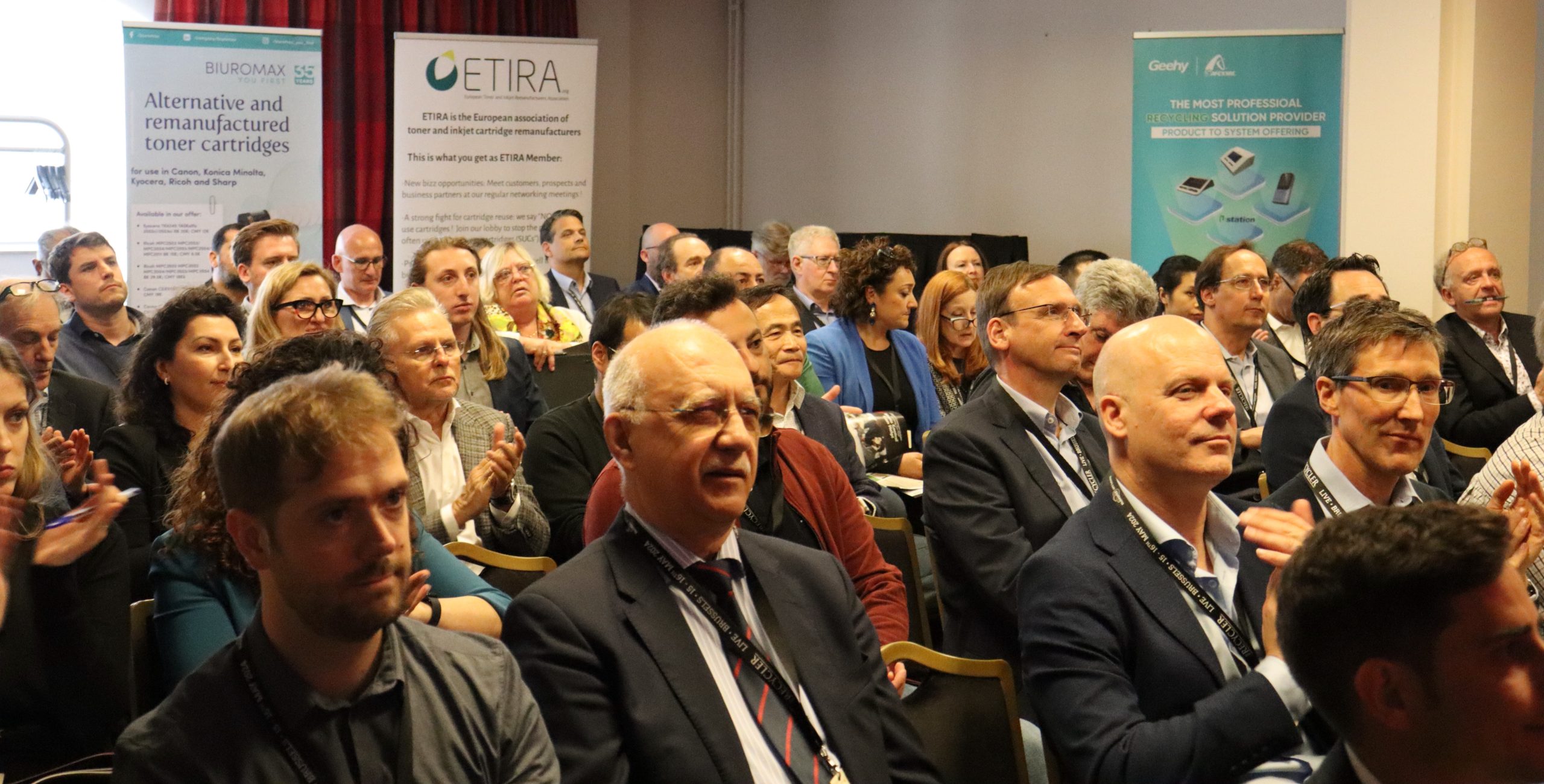
An eventful gathering of industry leaders
On 15-16 May 2024, ETIRA held its annual meeting in Brussels, coinciding with “The Recycler Live Europe” conference. With around 95 delegates attending, this event once again proved to be the premier gathering for industry professionals to network and stay updated on the latest industry trends.
Day One Highlights
The conference kicked off on Wednesday with a compelling presentation about the market in war-torn Ukraine. Following this, Jose Angel Munoz of GM Technology provided insights into the hardware reuse market in Spain. Karolina Wrzesniak-Cywl of Biuromax then discussed the crucial role of components and spare parts in cartridge remanufacturing.
The spotlight of the day was on the forthcoming EU ecodesign legislation for imaging equipment and cartridges. HP introduced its innovative approach to sharing chip resetting data with the industry, marking a significant shift compared to its current business model ETIRA’s Javier Martinez and Vincent van Dijk, along with Volker Kappius from Delacamp, delved into the new law’s implications, emphasising its potential to transform the cartridge remanufacturing landscape.
Keynote Address

Mathieu Rama of ECOS, a European NGO focused on environmental standards, delivered the keynote address. He highlighted the alignment of ECOS’s initiatives with the EU’s Right to Repair policy and advocated increased cartridge reuse. Bram Soenen from the Belgian Government provided insights into the general support for regulation among Member States.
ETIRA Members’ Meeting
At the ETIRA members’ only meeting, attendees reviewed and approved finance and other statutory matters. A significant portion of the discussion centred on the anticipated impact of the upcoming EU regulations on the ecodesign of printers and cartridges on daily business operations.
Networking and Awards
The evening reception and dinner, featuring the presentation of The Recycler’s Annual Awards, offered excellent networking opportunities. Delegates mingled and celebrated industry achievements.
Day Two Insights

Thursday’s sessions featured presentations from market analysts, including Charlie Brewer of Action Intelligence and Debra Hawkins and Peter Mayhew from Keypoint Intelligence, who shared the latest market research data. Additionally, Zhono provided valuable market insights, and industry veteran David Connett concluded the day with an analysis of the non-OEM new builds market.
Acknowledgements
ETIRA extends its heartfelt thanks to the event organisers, Stefanie Unland from The Recycler Magazine, David Connett from Connett & Unland GbR, and the numerous sponsors who made this event possible, including Static Control, Altkin, Biuromax, Denner, KMP, Consuprint, Delacamp, Geehy/APEX, and Nubeprint.
Our Sponsors and Supporters
The support from our sponsors is crucial to the success of our conference. Their contributions enable us to provide a platform for knowledge sharing, networking, and innovation. We deeply appreciate their commitment and support.
Tags
2024Brussels
ETIRA AGM
ETIRA AGM and The Recycler Live: Registration now open
April 4, 2024
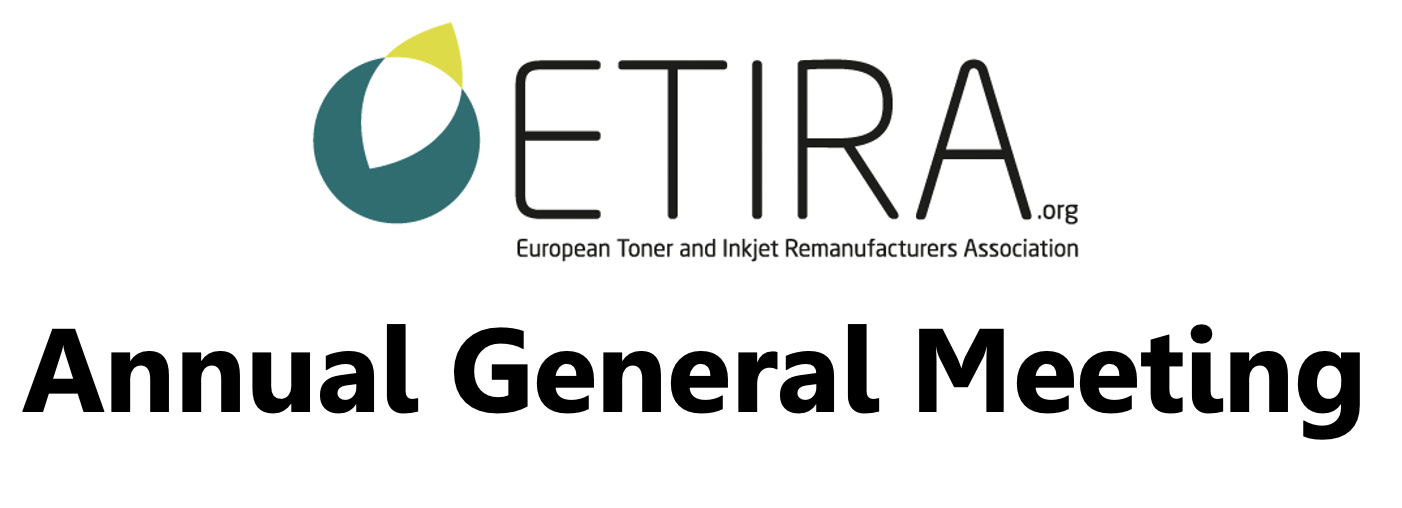
Registration for The Recycler Live Conference, in partnership with ETIRA, is officially open, marking an essential date for professionals and enthusiasts within the office imaging sectors. Scheduled for May 15-16, 2024, this event will take place in the heart of Brussels at the Martins Hotel EU, just a few hundred metres from the EU!
This year, the conference is all about change, aiming to spotlight the current and future trends across the sectors. From market insights and embracing change, the evolution and future of OEM remanufacturing, the way we work roller coaster, cartridge legality and compliance, regulatory shifts reshaping the imaging consumables landscape and a look at the European new build market.
Then there is what happens in Brussels, which goes around the world. ETIRA has been at the forefront of lobbying and promoting reuse and the independent imaging sector, and they have a lot to share. At the same time, we are collating our insights session, during which our business leaders share their perspectives on the market now and the changes they envisage.
Stefanie Unland, the director of The Recycler Live, emphasised the significance of Brussels as a venue, stating, “Brussels is at the heart of everything that happens in Europe and our conference venue, so close to the EU corridors of power, presents the perfect backdrop for this event.” The conference is designed to share the latest knowledge and information and create a dynamic environment for learning and networking.
The Recycler Live Conference promises to be a convergence of minds and ideas that could pave the way for the office imaging sector, reflecting the global movement towards sustainability. Attendees can expect to leave the conference enriched with new insights, strategies, and potentially transformative connections in the industry.
The ETIRA AGM will be held on the 15th of May, and the timings will be confirmed shortly.
Take advantage of the special Early Bird promotion for the Recycler Live Conference: for a limited time, take advantage of our 50% off the 2-for-1 registration offer! This unique opportunity allows you to attend for free, and a colleague or friend can attend this pivotal event and receive a 50% discount. Look for the registration information and links in our next AGM update newsletter.
Early registration ensures your place at the forefront of knowledge, information, and discussions and maximises your participation’s value. Don’t miss this chance to join like-minded professionals and experts in Brussels for an event that promises to reshape the future of the industry. Secure your spot now and double the impact with this exclusive Early Bird special.
New Ecodesign Proposals Unveiled
February 29, 2024
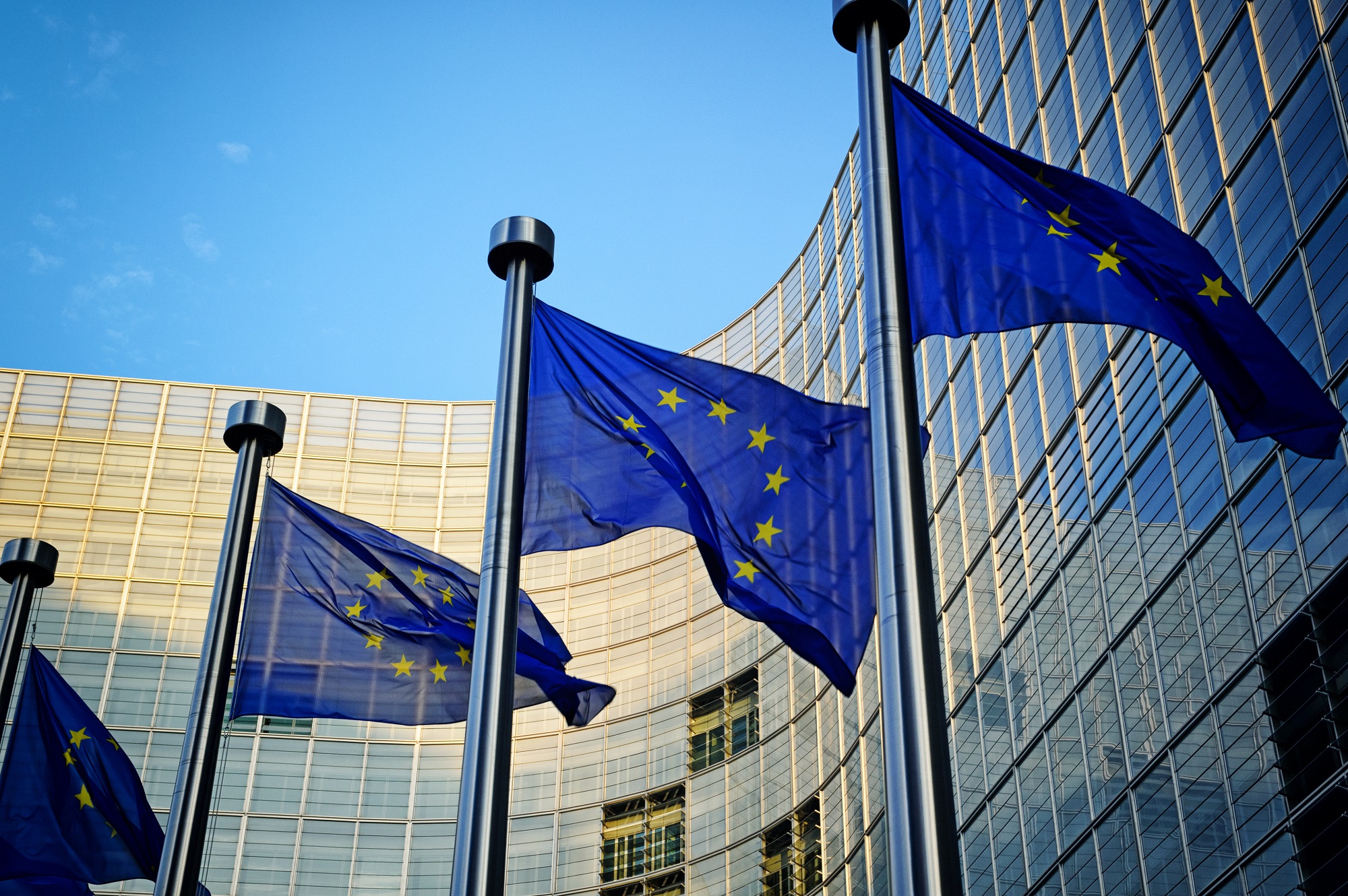
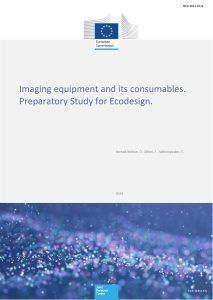 The European Union’s Joint Research Centre (JRC) has introduced ambitious ecodesign proposals to enhance the sustainability of printers and cartridges significantly. This initiative represents a pivotal shift towards mandatory regulatory measures, departing from the voluntary agreements that have characterised the sector since 2015. The JRC’s Preparatory Study outlines a comprehensive strategy focused on extending product lifespans, improving material efficiency, and fostering a circular economy.
The European Union’s Joint Research Centre (JRC) has introduced ambitious ecodesign proposals to enhance the sustainability of printers and cartridges significantly. This initiative represents a pivotal shift towards mandatory regulatory measures, departing from the voluntary agreements that have characterised the sector since 2015. The JRC’s Preparatory Study outlines a comprehensive strategy focused on extending product lifespans, improving material efficiency, and fostering a circular economy.
Key proposals include increasing the durability and reparability of printers, setting mandatory page yield requirements for cartridges, and promoting the use of remanufactured cartridges. Additionally, the JRC advocates for optimising energy savings, paper consumption, and the incorporation of post-consumer recycled plastic in printer manufacturing.
ETIRA President Javier Martinez welcomed the proposals, highlighting their alignment with the EU’s Green Deal objectives and their potential to reduce the environmental footprint of printing significantly. As the EU prepares to translate these findings into draft regulation, ETIRA commits to collaborating with stakeholders to ensure these positive advancements are realised.
You can download the JRC Report here.
Tags
EcolabelEU
JRC
ETIRA supports two consumer associations criticising HP
December 21, 2023

Recently, the European Toner and Inkjet Remanufacturers Association (ETIRA) has publicly announced its support for two leading consumer associations in their criticism of HP’s pricing strategies and the use of Dynamic Security in its products. This announcement is a response to recent developments highlighting HP’s practices that negatively impact consumers and sustainability efforts.
HP’s economic challenges have led to a strategic shift in its approach to Dynamic Security, a technology used to authenticate cartridges. This shift, aimed at expanding the scope of Dynamic Security, is set to lock out more aftermarket consumables. Many printers will only work when connected to the internet, and they lock out non-new HP cartridges. As a result, consumers are forced to rely on HP’s more expensive ink and toner cartridges. This move increases costs for consumers and poses a significant setback for sustainability efforts.
Recent reports in the Dutch consumer magazine Consumentengids and a study by the UK’s Which? have brought to light the significant price increases in HP ink cartridges, with some soaring by as much as 58% since 2011. These increases notably outstrip the inflation rate for the same period. Additionally, original printer ink remains prohibitively expensive, costing more per millilitre than luxury items like Dom Perignon Champagne and The Macallan Whisky.
ETIRA stands with the consumer associations in calling out these practices. The association emphasizes that limiting the use of refilled cartridges burdens consumers financially and undermines efforts to promote environmental sustainability. In an era where consumer rights and eco-friendliness are increasingly prioritized, HP’s tightening of Dynamic Security features appears misaligned with these values.
ETIRA urges HP to reconsider its strategy, focusing instead on policies that support consumer choice and sustainable practices, like cartridge reuse. The association believes that such a change is not only in the best interest of consumers but is also crucial for the long-term reputation and trust of the HP brand.
ETIRA remains committed to advocating for fair, competitive practices in the toner and inkjet market, ensuring that the rights of consumers and the importance of sustainability are upheld.
Tags
ConsumentengidsDynamic Security.
HP
Prices
Which?
Member Update – Special members only meeting
November 3, 2023

MARK YOUR DIARY: 12 DECEMBER AT 4 p.m.: ONLINE ETIRA MEMBER-ONLY INFO MEETING ON INDUSTRY REGULATION – BE THERE!
ETIRA invites all its members to an online meeting on 12 December to learn about the upcoming EU rules for our industry. The planned regulation is an industry-first and will materially impact how you can do your business for years. We already gave you some top-line info on 25 September, but now it is time for details. Members should be fully aware of the plans and express their views. So please don’t get caught off-guard: Join us on 12 December at 4 p.m. for a virtual info and networking session with your fellow members!
Log-in details will follow in December.
The online meeting will also approve ETIRA’s new statutes. As mentioned before, changes in the overall Belgian legislation require groups like ETIRA to adjust their laws to conform to the new rules. The changes are mainly administrative.
Tags
ETIRAMeeting
ETIRA to exhibit at Remanexpo 2024
October 31, 2023

ETIRA and several members to exhibit with a dedicated pavilion at Remanexpo, Part of Ambiente, this coming 26 – 30 January.
ETIRA has confirmed its participation in Remanexpo, a prominent segment of the renowned Ambiente trade fair. Scheduled to take place from January 26 to 30, 2024, in Frankfurt, Germany, this event promises to be a pivotal platform for the promotion of sustainable printing solutions.
Visitors to the ETIRA Pavilion, nestled within Forum 1 Hall, can expect to gain valuable insights into the latest activities of the association and its positive lobbying activities that have a positive impact on the environment. Several ETIRA members are co-sponsoring the pavilion. Thus the pavilion will serve as a meeting point for industry professionals, offering a casual atmosphere for discussions and networking opportunities.
ARMOR Print Solutions SAS is one of the co-sponsors. Their CEO, Gerwald van der Gijp, said: “ARMOR Print Solutions is proud to endorse the ETIRA Pavilion on the Remanexpo show, illustrating that integrating sustainability and social responsibility into your core business strategy can lead to a thriving and prosperous business.”
ETIRA, a leading voice in the remanufacturing sector, will use the occasion to highlight its ongoing efforts in promoting sustainable printing practices and the benefits of remanufactured printer consumables. Attendees are encouraged to drop by for a friendly chat, a refreshing coffee, or even something a little stronger at 5 p.m. to toast to the future of sustainable printing.
“We are delighted to participate in the Remanexpo show, standing united with ETIRA to further our collective mission in advancing sustainable printing solutions.” Said Jan-Michael Seig, CEO of KMP AG, who is also co-sponsoring.
The ETIRA Pavilion’s presence at Remanexpo wouldn’t have been possible without the generous sponsorship of industry leaders. Other co-sponsors, including IMEX, Katun, Delacamp, and The Recycler, have all contributed to making this showcase a reality, emphasizing their commitment to sustainable printing and the role of remanufactured products in achieving this goal.
“The Recycler wholeheartedly supports ETIRA and the invaluable work they continue to do in championing sustainability within the printing industry. Through the ETIRA Pavilion at Remanexpo, ETIRA highlights its initiatives for the benefit of its members and the broader office printing community.” Commented Stefanie Unland, Editor and Publisher of The Recycler.
Peter Knak, General Manager at IMEX Europe, said: “Supporting the crucial work of ETIRA, our participation in the Remanexpo show underscores our commitment to eco-friendly printing practices.”
The pavilion is expected to be a hotbed of conversation, offering a glimpse into the latest developments in remanufacturing and upcoming legislation and services. This event is an excellent opportunity for businesses and individuals looking to reduce their environmental footprint without compromising on quality.
“ETIRA’s dedication to sustainable remanufacturing aligns with our values, and we are honoured to be part of the Remanexpo show in support of their vital efforts.” Said Heidi Boller, General Manager for Katun EMEA.
ETIRA’s presence at Remanexpo, supported by its esteemed sponsors, underscores the growing importance of sustainable printing solutions in today’s world. With a focus on reducing waste and promoting eco-conscious practices, this event is set to make a significant impact on the printing industry. Make sure to mark your calendars and visit the ETIRA Pavilion at Ambiente 2024 for a taste of the future of printing.
